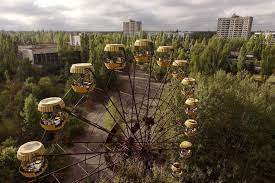Dark tourism refers to visiting places that are associated with death, tragedy, or suffering. These destinations can include sites of natural disasters, war zones, former prisons, concentration camps, and other morbid locations. People are often drawn to dark tourism for historical or educational reasons, to pay respects, or out of curiosity. However, ethical considerations surrounding exploitation and respect for the deceased are important aspects to consider in this form of tourism.
Click here to know more: https://www.youtube.com/watch?v=KUQuy6DsIZw
Dark tourism, a term that may initially evoke curiosity or unease, is a complex and intriguing aspect of modern travel.
It encompasses visits to places associated with death, tragedy, and suffering, offering a unique lens through
which to explore history, culture, and human resilience. From former battlefields to sites of natural disasters,
destinations provide travelers with an opportunity to confront difficult truths, pay respects to the past, and contemplate the fragility of life.
Understanding Dark Tourism
At its core, dark tourism is about confronting the darker aspects of human history and experience.
It encompasses a wide range of destinations, including:
War Zones and Battlefields: Places like Normandy, Hiroshima, and Gettysburg attract visitors seeking to understand the impact of war and honor those who fought and died.
Genocide Memorials and Holocaust Sites: Sites such as Auschwitz-Birkenau, the Killing Fields in Cambodia,
and the Rwanda Genocide Memorial serve as reminders of humanity’s capacity for cruelty and the importance of remembrance.
Disaster Sites: Locations affected by natural disasters, such as Chornobyl and Pompeii, offer insight into
the power of nature and the resilience of communities in the face of catastrophe.
Prisons and Concentration Camps: Prisons like Alcatraz and concentration camps like Dachau provide
glimpses into the harsh realities of incarceration and persecution.
The Appeal of Dark Tourism
While the idea of visiting sites associated with death and tragedy may seem morbid to some,
dark tourism holds a powerful allure for many travelers. Some are drawn by a desire for historical understanding ]and education, seeking to bear witness to significant events and honor the memories of those affected.
Others are motivated by a sense of curiosity or fascination with the macabre, intrigued by the stories and mysteries surrounding these destinations.
Ethical Considerations
Despite its appeal, dark tourism raises important ethical questions. Visitors must navigate a delicate
balance between curiosity and respect, ensuring that their presence does not trivialize or exploit the
suffering of others. Sensitivity, empathy, and a commitment to responsible tourism are essential when visiting dark tourism sites.
Dark tourism offers travelers a unique opportunity to engage with history in a profound and thought-provoking way. By confronting the darker aspects of the human experience, visitors can gain a deeper understanding of the past and reflect on the complexities of the human condition. However, it is essential to approach with sensitivity, empathy, and a commitment to ethical conduct, ensuring that these sites are treated with the respect and reverence they deserve.
Read More: https://placesandlifestyle.com/sustainable-tourism-a-journey-towards-responsible-travel/




